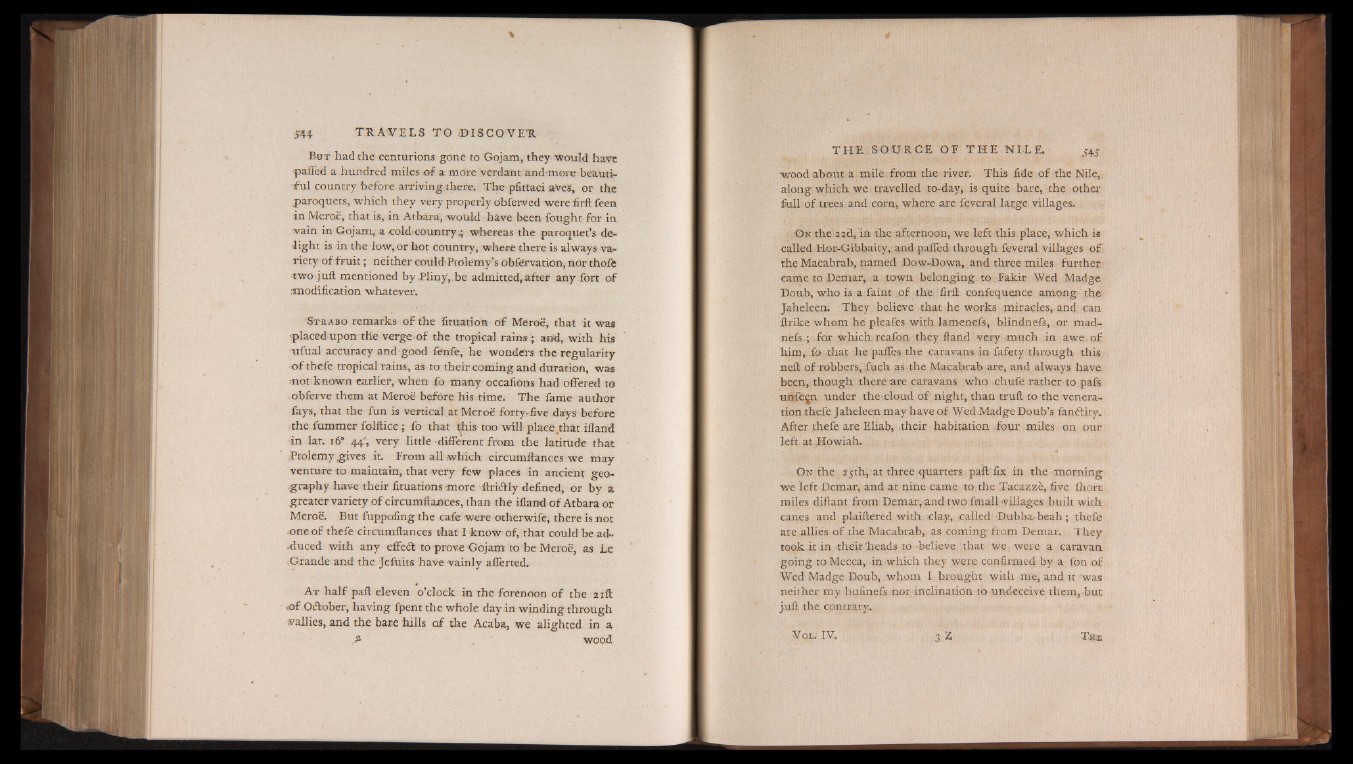
544 T R A V E L S T O -D IS C O V E R
But had the centurions gone to Gojam, they Would have
palled a hundred miles o f a more verdant and more be au tt
•ful country before arriving there. The pfittaci aveS, or the
paroquets, which they very properly obfer-ved were firft feen
in Meroe, that is, in Atbara, .would have been fought for in
v a in in Gojam, a co ld country;^ whereas the paroquet’s delig
h t is in the low, or hot country, where there is always varie
ty o f ,fru it; neither could-Ptolemy’s obfe'rvation, nor thofe
two juft mentioned by Pliny,.be admitted,after any fort o f
modification whatever.
’ S t r a b o remarks o f the fituation o f Meroe, that it was
placed upon the verge, o f the tropical rain».; and, with his
nifual accuracy and good fenfe, he wonders the regularity
o f tbefe tropical rains, as to their coming and duration, was
¡not known earlier, when fo many occafions had offered to
obferve them at Meroe before his time. The fame author
fays, that the fun is vertical at Meroe forty-five days before
the fummer folftice ; fo that this too w ill place .that ifland
in lat. 16° 44', very little different from the latitude that
Ptolemy „gives it. From all w h ich circumftances we may
venture to maintain, that very few places in ancient geog
rap h y have their fituations more ftriftly defined, or by a
greater variety o f circumftances, than the ifland o f Atbara or
Meroe. But fuppofing the cafe were otherwife, there is not
-one o f thefe circumftances that I know of, that could he adduced
with any effeft to prove-Gojam to be Meroe, as Le
¡Grande and the Jefuits have va in ly aliened.
A t h a lf paft eleven o’clock in the forenoon o f the 21ft
d fO A o b e r , having fpent the whole day in winding through
«rallies, and the bare hills o f the Acaba, we alighted in a
,<£ wood
wood about a mile from the river. This fide o f the Nile,
along which we travelled to-day, is quite bare, the other
fu ll o f trees and corn, where are feveral large villages. .
©Nthe 22d, in the afternoon, we left this place, which is
called Hor-Gibbaity, and paifed through feveral villages o f
theMacabrab, named Dow-Dowa, and three miles further
came to Demar, a town belonging to Fakir Wed Madge
Doub, who is a faint o f the. firil confequence among the
Jaheleen. They believe that he works miracles, and can
ftrike whom he pleafes with lamenefs, blindnefs, or mad-
ne£s.; far which reafon they ftand very -much in awe o f
him, fo that he palles the caravans in fafety through this
neft o f robbers, fuch as.the Macabrab are, and always have
been, though there are caravans who chufe rather to pals
unfeen under the-cloud o f night, than truft to the veneration
thefe Jaheleen may have o f Wed Madge Doub’s fanitity.
After thefe are Eliab, their habitation -four miles on our
left at Howiah.
On the 25th, at three quarters paft fix in the morning
we left Demar, and at nine came to the Tacazze, five fibort
miles diftant from Demar, and two ffnall villages built with
canes and plaiftered with clay, called Dubba-beah; thefe
are allies o f tire Macabrab, as coming from Demar. They
took it in their 'heads to -believe that we were a caravan
going to Mecca, in which they were confirmed by a fon o f
Wed Madge Doub, whom I brought with me, and it was
neither my bufinefs nor inclination to undeceive them, but
j-uft the contrary.
V o l . IV.